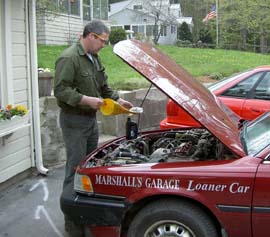
To get the most reliable service, longevity, and best resale for your automobile, we strongly recommend following the manufacturer’s recommended service schedules. These can be found in your owner’s manual, but as a convenience to both you… and us, we have these schedules and the most current Technical Service Bulletins from the manufacturer available on our computer, which we update regularly on a subscription basis.
We also recommend:
Transmission flushing every 30,000 miles – Completely renews transmission fluid, unlike conventional transmission changes which only change about 30% of the fluid in your transmission. This will help save you from inconvenient and costly breakdowns.
Computerized four-wheel alignments – Done every year, will extend the life of expensive tires and steering components. Plus make your vehicle more pleasurable and safe to drive.
Brake system flushing every two years or 30,000 miles – An often-overlooked item on your vehicle. Brake fluid is a natural desiccant. It absorbs water, thus degrading its ability to resist boiling at high temperatures and speeding the breakdown of its chemical makeup which helps protect sensitive braking components. Regular flushing of your braking system will keep you safer and protect the expensive components in your vehicle’s braking system.
Car Tips &Automotive Advice
How often should I rotate and balance my tires?
Your tires should be rotated every other oil change, or every 6000 miles. Generally speaking the tires should be balanced at the same time. Often times a slightly out of balance tire may go unnoticed when on the rear axle but becomes very noticeable when rotated to the front steering axle. Neglecting to rotate and balance tires is a major cause of premature tire wear.
Is it really necessary to replace my timing belt at the recommended interval?
YES. The failure of a timing belt in many cars can result in major engine damage. The cost of repairing an engine with a broken timing belt is much greater than the cost of a timing belt replacement.
What does it mean if my “check engine” or “service engine soon” light comes on?
There are many sensors and computerized components that manage your vehicle’s engine performance and emissions. When one of these fails, the “check engine” light is illuminated. Although your car may seem to run fine, it is important to have the issue addressed to prevent long-term problems.
What should I do if my car starts to overheat?
This is a very serious problem – if your car overheats for too long, you can damage your engine. As soon as possible, find a safe place to pull off the road and shut the engine off! Do not attempt to check the fluid level in the radiator as it can burn you. The best thing to do is have your car towed to a repair shop.
When should I get my oil changed?
You should get your oil changed every 3000 miles or as recommended in your vehicle’s owner’s manual. But remember, the owners manual recommendations are for optimal conditions, so you should defer to the oil manufacturers suggestions in most cases.
What is that milky brown engine oil?
Milky brown engine oil is an indication of coolant in the oil. This can be caused by a blown head gasket (other gasket), a failed transmission cooler, or cracked casings. This condition is very serious and needs to be checked by a professional technician quickly.
How to make sure my car battery has a good electrical connection?
Battery cables and terminals should also be cleaned and inspected regularly to make sure they provide a good electrical connection.
What is synthetic motor oil?
Synthetic motor oils are usually required for high output, turbocharged or supercharged engines, vehicles that are used for towing (especially during hot weather), or vehicles that are operated in extremely cold or hot climates.
Synthetic motor oils, though a bit more expensive than mineral-based motor oils, can improve fuel economy and provide longer intervals between changes. They also provide instant lubrication on start-up.
If you want the best for your automobile…synthetics should be used.
When should I replace my car’s fuel filter?
To help ensure dependable, trouble-free performance, replace your car’s fuel filter approximately every 30,000 miles or as recommended in your vehicle’s owner’s manual.
When should I change my spark plugs?
For maximum fuel economy and peak engine performance, your spark plugs should be replaced every 30 months or 30,000 miles, unless your vehicle is equipped with 100,000-mile platinum or irridium tipped spark plugs.
I need to replace a burned out fuse, what should I do?
Always replace burned-out fuses with ones of the same amperage (printed on the fuse) and note that if a fuse continues to “blow,” you should have the circuit checked professionally by one of our technicians for defects.






